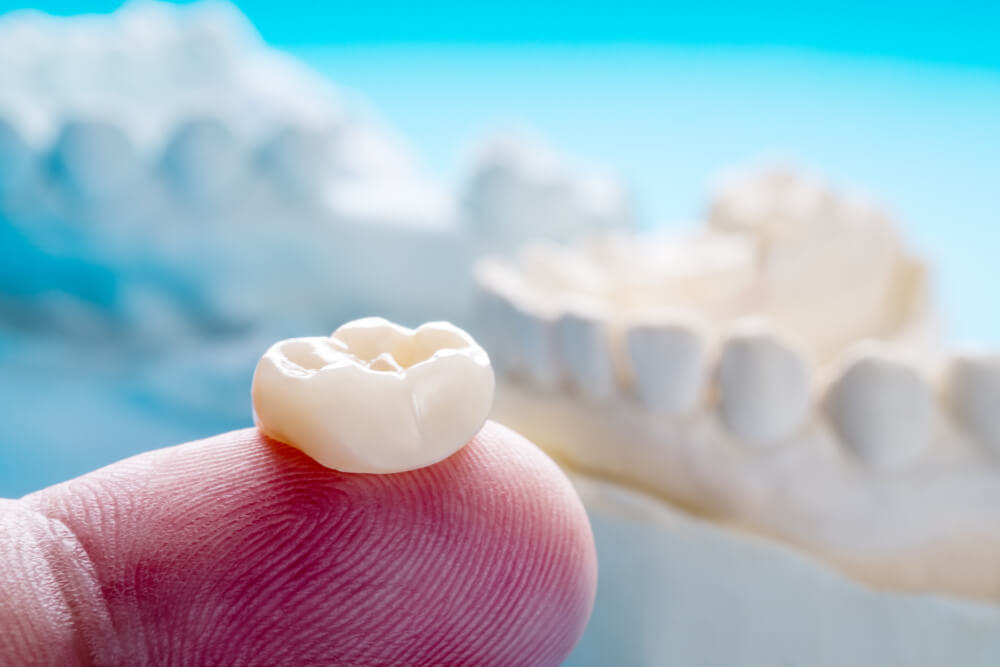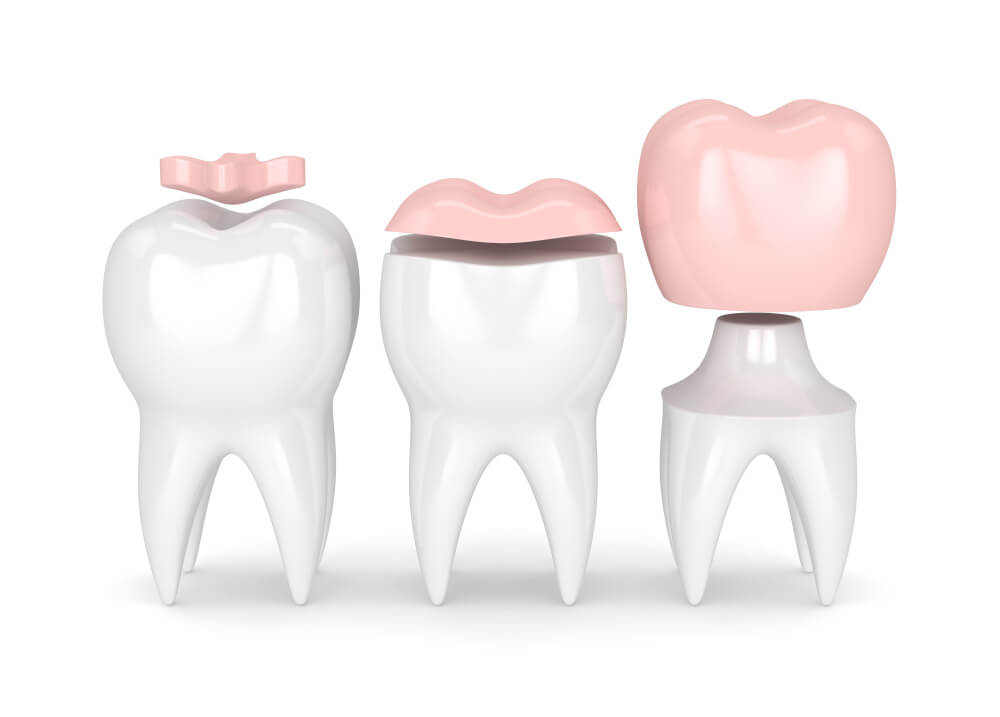A dental crown is a fixed prosthetic tooth-shaped cover or “tooth cap” that may be placed over a damaged tooth or implant to restore its appearance and function. Dental crowns may be created from a variety of materials and can last a lifetime with proper care. Depending on the type of tooth cap selected, dental crowns placed by an experienced dentist should look completely natural, matching the appearance of the remaining teeth.

When are Dental Crowns required?
A dental crown may be required when teeth are damaged. Examples can include large cavities, cracked or weakened teeth, or severely worn or chipped teeth. Teeth caps will also be needed to cover dental implants and hold a dental bridge in place. Some patients may choose to get a dental crown procedure for cosmetic dentistry purposes if they have misshapen or discolored teeth. The tooth crown will not only improve the appearance of the teeth for a brighter smile, but also strengthen them for greater functionality and prevention from further damage.
Types of Crowns
There are several types of crowns made from a variety of materials. The most common of these are described below:

Gold Crowns
Created from a combination of metals, the so-called “gold crowns” are the strongest and most durable type of crowns available. Less prone to wearing down than crowns of other materials, gold crowns are most often recommended for the back teeth that are highly used for chewing and less visible. The biggest disadvantage of gold crowns is their color, which obviously makes them stand out and look unnatural. Some people may also have negative reactions to the metal due to allergies.
Porcelain Fused to Metal Crown
The porcelain fused to metal crown provides much of the strength and durability of gold crowns without being an aesthetic nightmare. They have a metal structure that is capped by a porcelain coat to provide the appearance of a more natural tooth. Though much less conspicuous than the gold crowns, the porcelain fused to metal crown can show some grey at the base of the tooth making it look slightly discolored. Clenched teeth can also cause wearing down against the opposing teeth.
All Porcelain Crowns (or Ceramic Crown)
All porcelain crowns are the most popular type of crowns. They may also be known as a ceramic crown as porcelain is a type of ceramic. These crowns are one of the most aesthetically pleasing as they match the shape, size and color of the surrounding teeth to make them completely inconspicuous. Since no metal is used, they are completely non-toxic. While porcelain crowns can last a very long time, they are not as durable as a metal crown and are not recommended for excessive teeth grinders.
Lithium Disilicate Tooth Crown (E-Max)
Relatively new to the scene are E-Max crowns. These are made from a type of thin, light glass-ceramic material called lithium disilicate and also look completely natural. Unlike porcelain crowns, however, the E-Max tooth crown is extremely durable and strong so are often recommended for use in both the front and back teeth. The main downside is that it is considerably more expensive than their porcelain counterpart. There have also been some reports of failed procedures for back teeth.
Stainless Steel Crown
Usually a temporary measure, the stainless steel crown is prefabricated and used to protect a tooth for a period while the permanent crown is being created. They are also often used for children on their damaged or weakened temporary teeth to provide some protection until they fall out and their permanent teeth grow in. The stainless steel crown doesn’t require multiple visits to the dentist as they are not custom made, and are more cost effective than any of their permanent counterparts.

Dental Crown Procedure
In the majority of cases, multiple visits to your dental clinic are required for a dental crown procedure since permanent crowns are custom made to fit your tooth. Two visits will usually be sufficient, unless a dental implant or other complicated procedure is required. During the first visit, your dentist will perform a crown prep. This process may begin with taking X-rays of the tooth if this has not already been done.
Depending on the condition of the tooth, the crown prep may involve removal of decay or even a root canal if decay is severe. If the tooth cannot be saved due to extensive damage and decay, the remaining tooth may need to be extracted and replaced by a dental implant, which can then be covered by a tooth crown. For most cases, some of the outer portion of the tooth will also need to be filed down in order to fit the crown, and anesthesia will be applied to numb the tooth and gum tissue during and immediately after treatment.
Once the initial crown prep has been performed, your dentist will take a mold or digital scan of your teeth in order to create an exact model for the tooth crown. Since the permanent crown usually takes a couple of weeks to manufacture, you may also get a temporary crown to protect the tooth in the interim.
Your permanent crown will usually be installed during your second visit. This part of the dental crown procedure involves removal of the temporary crown and cementing the permanent crown into place. During this process, your dentist will double-check to ensure a good fit and make any adjustments as needed.
dental crown cost
When considering dental crown cost, most patients will also need to consider the cost of any other procedures that may go along with it. As we saw from the dental crown procedure section above, the crown prep phase can sometimes involve other extensive dental procedures such as root canals or dental implants. In such cases, there are clearly going to be higher costs to factor into your budget.
Even when looking purely at dental crown cost without considering other related procedures, prices can range from $500-$3000 depending on the type of crown and geographic area where you are being treated. While this is not cheap, dental crowns are made to last a long time, in many cases a lifetime, and are a worthwhile investment for quality of life.
In many cases, dental insurance may cover a large portion of the dental crown cost. Our dental office is committed to accepting a wide range of dental insurances including DentiCal (MediCal Dental), and our staff have extensive knowledge about the different coverages to ensure our patients receive the maximum benefits.
Things to consider when getting dental or tooth crown
Proper care of your tooth crown is key to durability, and with proper maintenance, they can last a lifetime. The standard oral hygiene practices such as regular visits to your dental clinic for checkups and teeth cleaning as well as brushing and flossing twice daily are important. Additionally, it is a good idea to avoid very hard and sticky foods and teeth grinders are recommended to wear a night guard to protect the crown and its surrounding teeth.